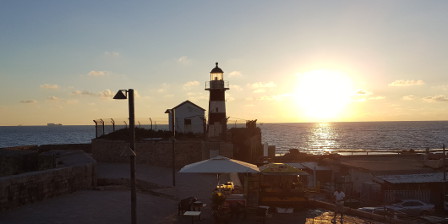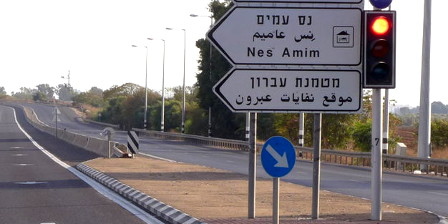Aktuelles
Aktuelles aus den Landeskirchen >>>
Aktuelles aus den Gemeinden >>>
Kolumne >>>
Buchtipps >>>

from... - die reformierte App

Newsletter

Wir auf Facebook
Pfingstpredigt
Nes Ammim - aus dem Alltag in einem nicht-alltäglichen Dorf in Israel. 51. Kapitel

Tobias Kriener erzählt:
04.06.2017
Heute gibt's nur meine Pfingstpredigt. Als Zugabe ein Sonnenuntergangsphoto vom Leuchtturm in Akko.
Ich war krank die letzten 3 Tage - deshalb habe ich leider die Exkursion mit Jussef zu dem zerstörten Dorf seiner Eltern verpasst. Aber ich habe ja den Trost, dass ich noch ein Weilchen hier bin und diese Tour nächstes Jahr mitmachen kann.
Ansonsten ist zu berichten, dass Katja jetzt auch Kontoinhaberin ist. Als wir den Papierkram bei der Bank Discont erledigt haben vor ungefähr 3 Wochen hat das in der Tat geschlagene 1 1/2 Stunden in Anspruch genommen, da der gute Herr Turdscheman völlig überfordert ist mit diesem Job und alle paar Minuten seine junge Kollegin um Rat fragen musste, weil er mit dem Computerprogramm nicht zurecht kam. Außerdem ging er natürlich bei jedem Klingeln an's Telefon und erledigte umständlich erst mal was anderes, bevor er sich dann wieder unserem Anliegen zuwandte.
Ich kannte das ja schon und hatte mich entsprechend mit Lektüre und Handyspielen gewappnet. Aber Katja drehte schier durch. Ich konnte sie nur mit äußerster Mühe abhalten, Herrn Turdscheman zur Eile anzutreiben, weil mir klar war, dass das nur kontraproduktiv sein würde. Zum Glück war keine Schere in der Nähe, sonst hätte sie die Telefonleitung durchgeschnitten, damit wenigstens diese Ablenkung aus der Welt wäre ...
Umso größer war die Überraschung, als wir tatsächlich schon in dieser Woche - unmittelbar nach Rückkehr vom Kirchentag - zwei Briefumschläge von der Bank Discont vorfanden mit Katjas Bankkarte und ihrer PIN-Nummer ...
Aber keine Sorge: Die israelische Bürokratie wird uns weiterhin in Atem halte. Das nächste Projekt ist zur Abwechslung mal wieder der Führerschein. Am 13. März hatten wir ja allen Papierkram für Katja beim Misrad HaRischuj (sowas wie bei uns das Straßenverkehrsamt) erledigt; für mich musste nur noch eine amtsärtzliche Bescheinigung eingeholt werden, dass meine Medikamente gegen Bluthochdruck und Cholesterin meine Fahrtüchtigkeit nicht beeinträchtigen. Die Dame dort schwor Stein und Bein, dass die Unterlagen binnen 4 - 6 Wochen bei mir sein würden. Inzwischen sind fast 3 Monate vergangen. Und die Zeit wird langsam knapp: Bis 3. September muss die Führerscheinprüfung unter Dach und Fach sein - das ist nämlich das Datum meiner Einreise im letzten Jahr; und im August will ich Urlaub be-chutz la-aretz machen ...
Immerhin haben wir schon unseren Fahrlehrer gefunden: Den Vetter unseres Kochs hier in Nes Ammim, der 10 Fahrradminuten entfernt in Mazra'a wohnt. Er meinte, er würde uns da tschik-tschak (was so viel heißt wie ruck-zuck) durchbringen. Wir sind gespannt ...
Predigt
Dear Nes Ammimniks, dear Guests,
today we commemorate the wonder of Pentecost. This day is often called the „Birthday of the Church“ - which is correct in a certain respect because since that day the disciples of Jesus overcame their fear and began to spread the Gospel
But this designation of this day is also misleading, because it suggests – and it often has been understood – as if something completely new began with this day: namely the history of the Christian church as opposed to the history of the Jewish people.
I would like to show with a series of readings from the Old Testament that the first Pentecost - when the disciples of Jesus overcame their fear and started spreading the Gospel – did not start something new, but on the contrary was closely connected to the history of God with his partners on earth and especially with his people Israel – that it in fact was something long expected.
But first let's hear the account of what the disciples of Jesus experienced as it has been related by Luke:
Luke 2, 1-21
The miracle of Pentecost is that people of very different backgrounds with different languages and different cultural heritages suddenly understand each other – across all that divides and sparates them.
When we hear this we are immediately reminded of a story form the very beginning of the Bible – the story of the attempt to build a tower in Babylonia. Let's hear the account in
Genesis 11, 1-7
So the first thing we learn is, that Pentecost doesn't bring something new into the world; it rather restores a state that was the original state of humankind: Everybody understood each other – there were no divisions or fractions. Only when humankind began to become arrogant and to reach for the heaven – which means: when they thought they themselves could fill God's space and his role - God dispersed them and mixed up their languages – with all the dire consequences this had for the life of the peoples. This original understanding and cooperation was restored on Pentecost – no less – but also no more.
The connection to obeying God's will is obvious for the Jewish disciples of Jesus – the connection to the feast of Shavuot that commemorates and celebrates the giving of the Torah – of God's commandments to the people of Israel through Moses. So let's hear the wellknown 10 out of the 613 commandments that were given to Moses.
Ex 20, 1-17
Living under the guidance of God's commandments is what makes the life of humans right - what gives ouir life meaning – what enables us to live togehter in peace in the communion with all of mankind. But this life under the guidance of God's commandments obviously is not to be taken for granted. According to the experience of the disciples of Jesus his life and his death on the cross were necessary and crucial to enable mankind to live their life under the guidance of God's commandments.
But the events around Jesus's death and resurrection filled them with fear and paralyzed them. Only 49 days later – on the feast of Shavuot – the miracle took place that enabled them to overcome their fear and to spread the good news of their experience with Jesus which enabled them finally to live the life under the guidance of God's commandments – that enabled them to reach out beyond all that was dividing humankind – to restore the original state of union and mutual understanding
They interpreted their wonderful experience by relating back to the word of their Bible (what is now our Old Testament) and they a found prophecy that explained to them what had befallen them. It's a short section in the book of the prophet Joel:
Joel 2, 28-29
Thus they could classify and integrate what had befallen them: it was nothing from another sphere or another world; rather it was something long expected – long hoped for: It was foreknown by Israels prophets. The old hopes of israel could now finally begin to be realized – the original state of mankind could start to be restored. They had work to do. And so they set out on their mission to unite mandkind under the will of God.
And that's what we here in Nes Ammim are still busy with: Doing our part to restore the original union of mankind – with the help and in the power of the Pentecostal spirit.
Dr. Tobias Kriener, Studienleiter in Nes Ammim, Juni 2017
Ein Fortsetzungs-Tagebuch auf reformiert-info. Von Tobias Kriener



